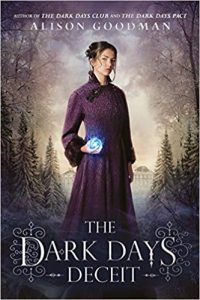Paul Di Filippo reviews Until the Last Dog Dies by Robert Guffey
— Special to Locus Online —
Until the Last Dog Dies, by Robert Guffey (Night Shade Books 978-1-59780-918-4, $15.99, 320pp, trade paperback) November 2017
 Somewhere up on a cloud–or somewhere down in the abyss–the ghost of Lenny Bruce is leering approvingly upon Robert Guffey’s Until the Last Dog Dies, after which the savage shade will nod off with a spike in his arm. Guffey’s book is a rarity these days, the essence of satirical, no-holds-barred SF, hilariously mean-spirited and meaningfully disdainful. It’s a book that might have issued in an earlier era from the pens of William Tenn, Robert Sheckley, or Ron Goulart. At the same time, it’s a black tragedy with a tiny feather of hope wafting in its passage. You will laugh continuously while reading it, while simultaneously looking over your shoulder to see if the Thought Police are monitoring your reactions to this heretical screed.
Somewhere up on a cloud–or somewhere down in the abyss–the ghost of Lenny Bruce is leering approvingly upon Robert Guffey’s Until the Last Dog Dies, after which the savage shade will nod off with a spike in his arm. Guffey’s book is a rarity these days, the essence of satirical, no-holds-barred SF, hilariously mean-spirited and meaningfully disdainful. It’s a book that might have issued in an earlier era from the pens of William Tenn, Robert Sheckley, or Ron Goulart. At the same time, it’s a black tragedy with a tiny feather of hope wafting in its passage. You will laugh continuously while reading it, while simultaneously looking over your shoulder to see if the Thought Police are monitoring your reactions to this heretical screed.
However, despite all these virtues, the book falls intentionally short of a full-blown societal détournement or transfiguration in the manner that perhaps the team of Pohl & Kornbluth might have enacted with the same premise. What, precisely, do I mean by this characterization of the novel? Only that its novum–a contagious virus that wipes out the brain’s capacity to enjoy or understand humor–is viewed solely through the lens of the narrator’s personal life, its impacts on him and his crowd, and so we see hardly any of the larger cultural effects that a Pohl & Kornbluth treatment might have focused on.
Let me use this analogy to make things clearer: if Guffey’s book were about telepathy, it would be Robert Silverberg’s Dying Inside, not Alfred Bester’s The Demolished Man.
Our tale opens in the year 2014. This choice of a recent past era as venue for world-shattering developments immediately casts the book as a counterfactual. We all know this scenario did not go down as specified. This is another lateral move that a different SF writer more intent on near-future frights or warnings might have eschewed. But Guffey is pulling the same move PKD used in Radio Free Albemuth: seeking to highlight our historical times by an allegorical or parallel world.
We are in the hands and mind of Elliot Greeley, a moderately successful standup comedian who survives on a circuit of comedy club gigs. Greeley’s shtick is kinda observational comedy, kinda surreal musings, kinda non-PC transgressive bits. Guffey is not shy about transcribing large swaths of Greeley’s material, which actually delivers the promised riffs. It’s analogous to having a protagonist who is described as a genius poet. You have to prove it and make the audience believe it with some samples. This Guffey does, conjuring up the deep reality of Greeley’s talents and life.
Greeley has a circle of friends, also comedians: Heather, Danny and Karen. Instantly, one begins to cast them in Seinfeldian terms, with Elliot as the lead. Heather, cynical and standoffish, would be Elaine. Danny, relatively quiet and schlubby, would be George. And Karen, an adventuresome angry black lesbian–well, I guess the Kramer role falls to her. Indeed, I think Guffey plays deliberately on this famous quartet, but his version is no mere parody. The relations amongst the quartet are unique, and soon go off any predictable sitcom rails, especially once the news reports about the brain-damaging virus arrive. Guffey’s description, late in the narrative, of the dying comedy scene and the lobotomized crowds is matter-of-fact chilling.
Clubs began closing late in November. At first this didn’t worry me. Older comedians assured me they’d lived through such busts before. When the comedy boom of the ’80s–which gave birth to thousands of clubs with names like Chuckles and The Laffery–finally came to a screeching halt at some point during the first Bush administration most of the alternative comics were relieved. After all, too many clubs could only mean too many bad comics. I had a similar reaction when I first heard The Rumor, which was spreading through the back rooms of comedy clubs all over the city early in December. The Rumor was this: The humor virus had taken its toll. Five major clubs in L.A. were going to be shut down in the same week. All across the country fewer and fewer people were showing up at the clubs. Why should they? Imagine a blind man paying hard-earned money to go to a strip joint. Even the core clientele, who I think had continued to show up for the past couple of months just out of pure force of habit, had ceased coming in. Playing at the clubs, once the high point of my life, had now become a torturous ordeal that I underwent only to pay the bills. I ceased coming up with new material. Why bother? No one was listening. That was my excuse at any rate.
But prior to this Comedy Apocalypse, Greeley will undergo a wild-eyed series of adventures, something that Matt Ruff or Jonathan Lethem or Thomas Pynchon might have conceived. Most of his bizarre exploits revolve around a rock band named “Doktor Delgado’s All-American Genocidal Warfare Against The Sick And The Stupid” and their sexy but messed-up guitar player Esthra. The fact that Esthra’s drug-crazed boyfriend is also in the band and highly jealous of any rivals adds deadly spice to the doings. This part of the tale is like the Coen Brothers film Inside Llewyn Davis as if scripted by a pair of Wilsons: S. Clay and Robert Anton.
By turns mystical and ashcan-real, insanely funny and grimly ghastly, Guffey’s novel cuts a zigzag trail through conventionality as it follows Elliot Greeley in his half-serious, half jesting quest for some deeper meaning to existence. If you build your life on laughs, what happens when the laughs disappear?
Kissing cousin to Max Barry’s novel Lexicon, about killer language, and to Ben Marcus’s The Flame Alphabet, about language killed, Guffey’s standup debut is standout speculative fiction.





